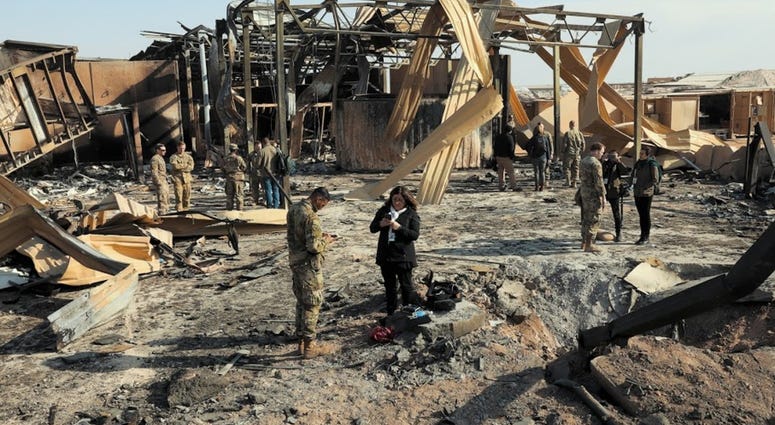
In light of the global coronavirus pandemic, much of America may have forgotten the January missile strike that had the U.S. seemingly teetering on the edge of war with Iran — but these airmen certainly have not forgotten.
"I was being forced to gamble with my members' lives by something I couldn't control. I was deciding who would live and who would die," Lt. Col. Staci Coleman wrote in an Air Force Central Command testimonial of airmen who were on al Asad Air Base in Iraq when it was struck.
"Eighty staying behind to continue the mission. Eighty leaving to make sure the mission continues. We trusted our flight commanders and they trusted us," Maj. Johnathan Jordan wrote in the document which was first reported by Task and Purpose.
"I wasn't ready to die, but I tried to prepare myself with every announcement of an incoming missile," Master Sgt. Janet Liliu wrote. "I had to. We all had to."
The strike was a retaliatory attack following the United States killing of Maj. Gen. Qassem Soleimani in a controversial drone strike ordered by President Donald Trump. While senior defense officials and the president both communicated immediately after the attack that there had been no fatalities or casualties as a result of the attack, the story changed over the coming weeks.
Despite previous statements, 11 U.S. service members were injured during the Iranian missile strike
A month later, more than 100 troops had been diagnosed with traumatic brain injuries from the strike.
Pentagon now says 109 troops diagnosed with TBIs from Iran missile strike
Now, written testimonials from the airmen who survived the attack are painting a more detailed picture of "shock waves," "dust," and "debris."
"I kept thinking, 'The next one is coming for us,'" Staff Sgt. Brian Sermons wrote. "'I won't be able to see my wife and kids again. My parents and my brother. They're going to be left on this earth without me. I just want to hug them one more time.'"
The testimonials also seem to rectify some aspects of the missile strike that were unclear for some time after the attack. For example, Iran allegedly warned personnel on the airbase that an attack was imminent.
More than one airman wrote that they were warned of the attack hours before it was meant to occur. They were even given an approximate window — between midnight and 2 a.m. The warning window allowed for evacuation measures — airmen in leadership roles wrote of the "biggest challenge" they had to face in deciding who evacuated and who stayed.
But no amount of warning could have prepared airmen for one of "scariest" things they have "had to endure."
"It's full of floating dust and insulation, and it's hard to see anything," Sr. Airman Warren Gibbins wrote of the inside of the TOC after a missile landed 50 yards away destroying a living area. "There were a couple more impacts, then we felt a break in explosions and took advantage of the lull to move to the nearest concrete bunker."
"We were exhausted and afraid. More explosions, then silence. We finally hear the 'All Clear,' but there's no stopping," Sermons wrote. "The mission must carry on and I switched to auto-pilot. I eventually stopped shaking after a day or so."
The attack drew renewed attention to the problem of traumatic brain injuries within the military. Shortly after the injuries were first reported, Trump described them as "headaches" and said they were "not serious."
Trump 'won't be changing his mind' on TBIs
Trump stood by that assessment even after the number of injuries exceeded 100.
Russia and Iran have both made uncharacteristically aggressive moves toward the United States in recent weeks — Iran at sea and Russia in the air. Across the globe, countries are being forced to contend with the coronavirus while also ensuring the maintenance of national security.
As more and more active-duty service members test positive for COVID-19 — 3,496 as of Tuesday morning — the national security capabilities of the United States are being called to question. Secretary of Defense Mark Esper maintains that the United States is as ready as ever to defend itself.
—
